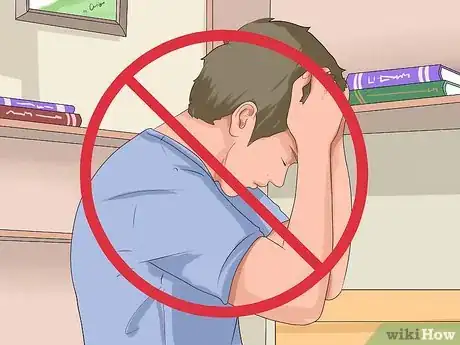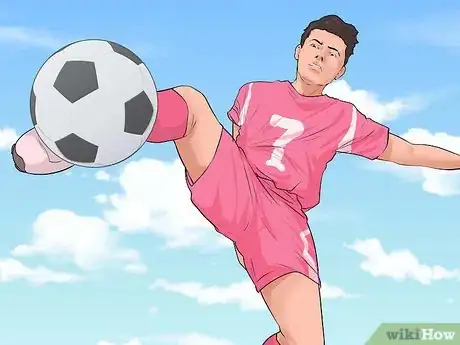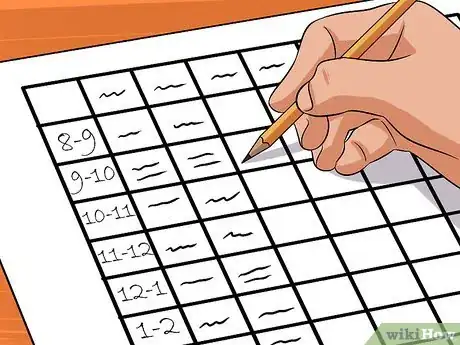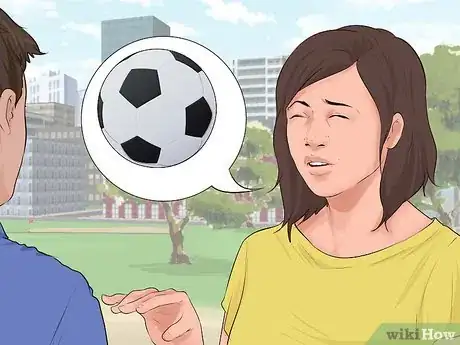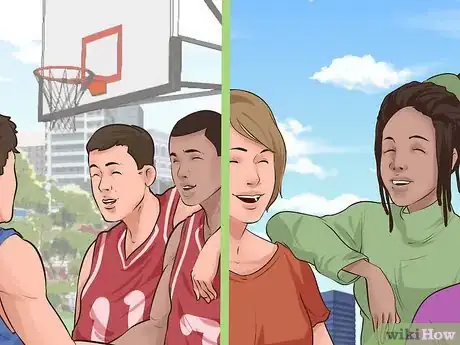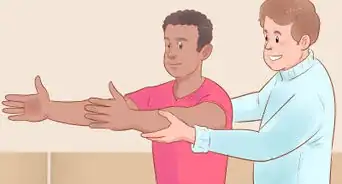wikiHow is a “wiki,” similar to Wikipedia, which means that many of our articles are co-written by multiple authors. To create this article, 29 people, some anonymous, worked to edit and improve it over time.
There are 8 references cited in this article, which can be found at the bottom of the page.
This article has been viewed 135,225 times.
Learn more...
No one can be good at everything, but you can attempt to do your best at everything you try. Make concerted efforts to contribute your skills and talents to activities that interest you. While you might not be the best person in each activity, doing your best will help you appear good.
Steps
Appearing Good at Everything
-
1Read widely. Know about what is happening in the world.Read the newspaper or online news sites daily. Be able to discuss current events. Also, read classic and contemporary literature. Lastly, read blogs about science or the arts to stay current on those themes as well. The more information you gather, the more you really will know!
-
2Eliminate perfectionism. If you constantly worry about achieving perfection, you will not appear good at activities. Rather, you will seem agitated, worried, and stressed. Learn to Control Perfectionism and accept that you will not always be the best but you still can do well. Letting go of perfectionism is also important for your mental and physical health.[1]Advertisement
-
3Develop a good memory. Be observant about what happens around you. Listen closely to what others say. By remembering facts and stories, you will demonstrate not only that you have a good memory or a wealth of knowledge but that you care about others. See Improve Your Memory for more tips.[2]
-
4Work on your hand-eye coordination. Essential to sports involving balls, being coordinated reduces your chance of being clumsy. Seeming "good" at everything also can apply to sports. Improving your coordination can impact your reaction speeds and depth perception. See Improve Eye Hand Coordination for more tips.[3]
Becoming Good at Select Things
-
1See what interests you. If you want to seem good at something, it pays to be good at something you enjoy! Explore your interests and pick a few activities or perhaps academic subjects that intrigue you. For example, you might decide to be a figure skater who likes chemistry. Alternatively, you might be a badminton player who likes visual art.[4]
- You probably know whether you tend to focus on one activity or participate in many. Always aim for balance when seeking activities to master.
-
2Develop good time management skills. Part of “seeming good” at something comes from diligence. Show up to practices on time. Complete your homework before it’s due. Don’t be over-stressed and try not to be the best at so many things that you are overwhelmed.[5]
- Plan out practice times. For example, if you’re a skater, you could practice on three different days. In addition to training with your coach, buy private ice time in advance or find a group with whom you can split costs.
-
3Practice or study hard. Depending on what activities you choose, being “good” doesn’t happen immediately. You will need to put in practice time or study.[6] You will have to give it your all. Many people can become good at something through effort.
- Finding practice partners or study buddies can help make your improvement more fun.
- Don’t feel discouraged if even with much practice, you are not particularly talented in one field. Effort matters as much as talent!
-
4Read about your field. Whichever subject you want to master, read blogs or online articles about that theme. See what innovations are happening. Know who the major stars are of your sport. Being able to converse with other interested people about your field will show your competence.
Creating an Aura of Confidence
-
1Speak confidently about your activities. When discussing your sport or academic subject, talk about how much you enjoy it. Tell your friends and family that you plan to do your best in an upcoming activity. Demonstrate your knowledge in an interested but not an arrogant way. People will notice your interest and might regard you as being good. They might ask you further questions, which is an opportunity for you to show your expertise.
- For example, you might say, “Wow, I’m so excited for my competition this weekend. I have been working really hard with my new choreographer and cannot wait to give my full effort.”
- You also might discuss a recent news item and your thoughts on it.
- It is also okay to express doubt or worries sometimes. Instead of broadcasting your thoughts, however, tell only a few close friends or your parents. This will help your confident image stay.
-
2Act confident. Whether you are taking an exam or performing a competition routine for figure skating, express confidence. Use confident body language when conversing with others. Smile at others. Do not slouch. Instead, stand up tall and speak clearly. Rather than crossing your arms, keep them open or at your hips. See Make People Think You Are Confident for more tips.[7]
-
3Socialize in many groups. People who are well-rounded might seem “good” at everything because they are well-connected. In truth, they might be generalists who just try many activities. Being open to new experiences, though, is in fact a good thing. Plus, the more people you meet, the farther your reputation spreads.
- Consider finding friends in different areas of your school or community too. For example, if you’re into skating, you could have other skaters as friends. You might also have friends from chemistry class or choir.
-
4Be kind to others. In addition to concrete activities, being “good” at everything, extends to your social skills. Show kindness through volunteer work or helping friends when they are in need. Listen intently when your friends tell you stories or about their problems. Give advice when they ask for it. Also, compliment others. Often, confidence comes from not having to prove your the best but in highlighting the best in others.
- You might consider volunteering at a soup kitchen or collecting food for the homeless.
- You could help your friend with her math homework.
- See Practice-Random-Acts-of-Kindness for more tips.
-
5Maintain humility. No one is good at everything and absolutely no one is perfect. If you want to appear competent in what you do, that is good and fine. It is important, however, to be modest and humble. Do not brag about your successes.[8]
- For example, do not say, “Wow, I went to the competition this weekend and beat everyone in the free skate. I won gold!” Instead, wait until people ask you how the competition went. Then you might say, “I did my best and was very pleased.” If they ask you what place you received, then feel free to say, “I placed first.”
- See Be Humble for more advice.
References
- ↑ http://www.sciencedaily.com/releases/2015/07/150731105248.htm
- ↑ https://www.health.harvard.edu/healthbeat/7-ways-to-keep-your-memory-sharp-at-any-age
- ↑ https://www.health.harvard.edu/staying-healthy/activities-to-sharpen-your-eyehand-coordination
- ↑ https://www.nytimes.com/guides/smarterliving/how-to-find-a-hobby
- ↑ https://www.indeed.com/career-advice/career-development/time-management-skills
- ↑ https://learningcenter.unc.edu/tips-and-tools/studying-101-study-smarter-not-harder/
- ↑ https://www.psychologytoday.com/us/blog/mental-hygiene/202112/how-act-confident
- ↑ https://greatergood.berkeley.edu/article/item/humility_will_make_you_greatest_person_ever
About This Article
By learning a little bit about lots of things and practicing some universal skills, you can seem good at everything. Try to read as widely as you can, including various newspapers, magazines, websites, and books, so your knowledge will be more well-rounded. Read about popular topics like the arts, science, politics, and psychology. Make an effort to remember the things you learn so you can slip some random facts into conversations and impress people. You should also socialize with different groups of people so you'll learn interesting things and develop new skills. Whatever you do or say, be confident about it, which will make you seem like you know what you're doing or talking about. However, avoid bragging so you'll come across as humble. For more tips, including how to stay humble when being good at things, read on!

